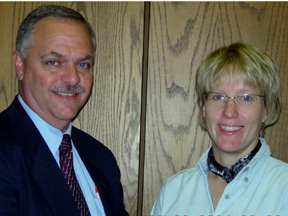 |
Joe Evans, Ph.D., and Jodi Polaha, Ph.D., are honored by the Nebraska Rural Health Association. |
Jodi Polaha, Ph.D., assistant professor of pediatrics, department of psychology, Munroe-Meyer Institute (MMI), and Joe Evans, Ph.D., professor of pediatrics and director of the MMI Psychology Department, were named the Integrated Rural Healthcare award winners at last month’s Nebraska Rural Health Association conference.
Each received a glass award and $250 for their work in rural Nebraska.
The award came as a surprise to Dr. Polaha, who directs the pediatric outreach integrated behavioral healthcare program.
“For a long time our department only provided services to families who could come to our offices at 44th and Dewey,” Dr. Polaha said. “That was fine but we wanted to find a way to help all of the families who needed it throughout the state.”
A significant problem in pediatric primary care is the presence of childhood behavior problems, she said, such as attention deficit hyperactivity disorder, non-compliance and oppositional behavior.
But many of the physicians in rural Nebraska have no one to refer their patients to.
That was until seven years ago when in an attempt to expand services Dr. Tim Riley, a psychologist formerly with MMI began to drive to Columbus, Neb., to see patients.
The clinic was a success, and soon after the pediatric outreach integrated behavioral healthcare program expanded with clinics opening in Fremont, Plattsmouth and Papillion, Dr. Polaha said.
Each clinic is held at the doctor’s office in cooperation with the primary care physician. “This provides better coordinated care and there is less stigma for the patient,” Polaha said.
In addition, pre-doctoral interns and post-doctoral fellows are able to be trained by psychology faculty in rural sites and learn how to work in rural primary care. In the past several years many of these trainees have relocated to rural communities and continue to practice at these clinics after graduation.
“A recent graduate of our program who completed a two-year internship opened a clinic in Chadron, with branch offices in Gordon and Crawford, Neb.,” Dr. Polaha said.
In nominating the founders of this program for the award, Marcia M. Freer, said, “The program has strived to improve behavioral healthcare through other efforts, as well. The group has provided over 50 lectures and workshops in rural Nebraska over the past five years and has been instrumental in collaborating with community agencies in writing local grants that support projects in rural areas.”
Funding for the program has come from a combination of two federal grants from the Health Resources and Services Administration and from clinical revenue generated by the service activities of the clinics.
Dr. Evans, principal investigator for these Bureau of Health Professions grants, said the rural behavioral health-training program has been a blessing for some rural residents who would otherwise need to travel across the state to see a pediatric behavioral health provider.
To date, families from 103 Nebraska communities, representing 43 of the state’s counties, have been seen in the rural Behavioral Health Clinics.